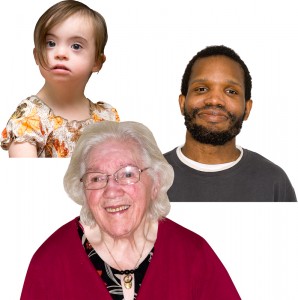
Thanks to Holly Wake, Emma Brown, Miriam Ziriat, Hannah Cross, Afia Ali and Angela Hassiotis for writing this blog in advance of our Mental Health Question Time event on 13th June 2018: Why are people with intellectual disability failed by health services?
The National Institute of Clinical Excellence have released their latest guideline for service design and delivery for people with learning disabilities and behaviour that challenges. An estimated 1.2 million children, young people and adults in England have a learning disability, with 10-17% of them displaying behaviour that challenges (Allen et al, 2007).
The new guideline includes a number of recommendations that may improve service delivery, but they will require a significant change in practice. There are also issues with the evidence base, cost effectiveness calculations and feasibility of these recommendations. The guideline is aimed at commissioners, health and social care professionals and providers to support service users to live in ordinary housing, with a shift in focus to prevention and early intervention and away from inpatient admission. The guideline can be read alongside NICE’s challenging behaviour and learning disabilities; prevention and interventions guideline (NICE, 2015).
The guideline focuses on a number of areas including:
- Managing risk and assuring quality of services
- Involving people and their family members/carers
- Co-ordination and planning of care
- Supporting people to use personal budgets and supporting families and carers
- Developing strong services in the community
- Specialist behaviour support
- Housing and day to day support
- Alternatives to residential placements
- Making the right use of inpatient services
- Accommodating the needs of services users in, or at risk of contact with the criminal justice system
- Respite care and short break services.
The guideline is expansive, but we have summarised some of the key points below.

An estimated 1.2 million children, young people and adults in England have a learning disability, with 10-17% of them displaying behaviour that challenges.
Commissioning
Local authorities and clinical commissioning groups should jointly designate a lead commissioner to oversee the commissioning of health, social care and education services for everyone with a learning disabilities. This includes those who are at risk of developing, as well as those who are already displaying behaviour that challenges. The lead commissioner should:
- Take a ‘whole life’ approach enabling smooth transitions from childhood to adult services
- Pool budgets and other resources to develop local and regional services across health, social care and education and with neighbouring authorities
- Consider jointly commissioning the most specialised behaviour support services across areas for those with complex needs
- Ensure that funding mechanisms support creative and flexible community-based responses, such as a contingency fund that service providers can draw on quickly if there is a crisis
- Ensure that service planning and delivery is based on an assessment of current and future needs and is co-produced with service users, their families, carers and independent advocates using a person-centred approach.

The guideline recommends designating a lead commissioner to oversee the commissioning of health, social and educational services for people with learning disabilities.
Funding
It is suggested that a range of funding arrangements should be available such as direct payments, personal budgets or individual service funds, and that an individual should be supported to make a choice on this if they wish.
Service providers
NICE recommend that learning disability service providers should:
- Work in partnership with each individual, their support network and named practitioner to deliver and review their care plan
- Match the specific skills of staff to the characteristics of the person as soon as care planning begins
- Meet the person’s needs and preferences, taking a positive approach to risk management and identifying what to do in a crisis
- Plan ahead to reduce the chances of a crisis arising and have support readily available to quickly respond if a crisis situation does arise, for example providing an out-of-hours helpline
- Ensure that in a crisis, short breaks are community-based, close to home and a positive experience for the person being supported
- Consider inpatient admission only if the person’s needs cannot be met safely in the community. Residential placements should only ever be an alternative if all other options have been exhausted.

NICE recommends that services should take steps to reduce the chance of crisis for service users, e.g. providing an out-of-hours telephone helpline.
Named workers
The new guideline recommends that a single practitioner should be allocated to each individual with learning disabilities and behaviour that challenges as their ‘named worker’. This named worker should:
- Coordinate support that is person-centred, reflecting the individual’s needs and choices, allowing them to take an active part in all aspects of daily life that they choose
- Arrange regular meetings to discuss the person’s care inviting people in their support network, including family members, carers, and independent advocates
- Provide, alongside the local authority, everyone with information on sources of support including community support, specialist behaviour support, local safeguarding procedures and support in an emergency from first contact onwards.

The guideline recommends allocating a dedicated named worker to each service user with learning disabilities
Strengths of the guideline
This is the first guideline produced by NICE and The Social Care Institute of Excellence (SCIE) to provide valuable systematic, evidence-based recommendations for designing services that work for people with learning disabilities across the lifespan.
Equality and diversity issues have been considered throughout the development of the guideline using an equality impact assessment. The guideline also has an easy read version making it more accessible to service users, carers and family members.
The guideline has been developed by a committee which included people who use services; family members and carers of children, young people and adults with learning disabilities who display behaviour that challenges; and an array of professionals and experts. It has used information from an extensive review of research evidence, and from expert witnesses.
Quality of evidence
Whilst the guideline did use an extensive systematic review of the available literature, unfortunately many of the recommendations were based on poor quality research evidence. Most recommendations were supported by low to moderate quality evidence, with only 2 high quality RCT’s, 2 high quality systematic reviews and 3 high quality studies using other research designs cited as evidence. Many of the recommendations were based on guideline committee’s opinion or on expert witness testimony. Whilst the committee drew on a range of professional and lived experience, the lack of high quality research evidence supporting the guideline limits our confidence in the effectiveness of the proposed recommendations.

There was limited high quality evidence for the NICE Guideline Committee Development Group to draw upon.
Implementing recommendations
Some aspects of the guideline would require a significant change in practice in order to carry out effectively, e.g. recommending a ‘named worker’ (i.e social worker or community psychiatric nurse) responsible for the coordination of regular, long term support. Whilst this would address significant needs within services, this increased contact with services would also carry significant cost implications.
Furthermore, the suggestion of a single joint commissioner across health and social services could help ease the practical barriers of working across health and social care. However this would require significant restructuring of services and would be heavily dependent on the availability of local funding.
Costings
NICE acknowledge a lack of supporting evidence related to cost effectiveness due to few robust study designs to base their guideline on. Therefore, much of their cost-effectiveness evidence is based on expert witness testimony, resulting in assumptions about the associated cost implications. NICE guideline developers have, at points, performed additional economic modelling in some areas of the guideline to try to provide further insight into the associated cost of their recommendations. However, this was only used for a few areas covered in the guidelines such as respite care.

It’s unclear how much the proposed recommendations for service design and delivery will actually cost.
Service delivery model recommendations
Whilst previous guidelines offer general advice about what good mental health service delivery should look like, individuals with learning disabilities often have multiple and complex needs which require a specific, structured and comprehensive service design model.
The current guideline does not clearly state which service models could be more clinically and cost effective for service users with learning disabilities and complex needs. There is generally limited evidence comparing different models of service delivery in a way that could inform the commissioning and development of services.
Summary
Many of the recommendations in the guideline such as including service users in decisions about living arrangements, delivering services in a person-centred way and ensuring carers and support networks are involved and supported, are generally considered principles of good practice by clinicians. However, the feasibility of delivering these principles to service users on a day to day basis is limited by funding and resource constraints.
Overall the guideline takes steps to outline general ways in which services can be delivered to service users with behaviour that challenges, their families and carers. However, much of the guidance is broad and as with all guidelines, it is open to local interpretation and adaptation. Suggestions such as staff accessing high quality supervision and support without specifying frequency, content and by whom, are of little help in skilling up support workers and paid carers.
The Guideline Development Group have highlighted the need for more research into the field of learning disability and challenging behaviour to inform future service design and delivery for this population. Suggestions for future research include developing effective and cost effective models of person centred care, supported living and developing approaches to support family members and carers.

Suggestions for future research include developing effective and cost effective models of person centred care, supported living and developing approaches to support family members and carers.
Links
Primary paper
NICE (2018) Learning disabilities and behaviour that challenges: service design and delivery. NICE guidelines 2018 [NG93].
Other references
Allen DG, Lowe K, Moore K, Brophy S. (2007) Predictors, costs and characteristics of out of area placement for people with intellectual disability and challenging behaviour. Journal of Intellectual Disability Research. 2007, 51(6):409-16. [PubMed abstract]
NICE (2015) Challenging behaviour and learning disabilities: prevention and interventions for people with learning disabilities whose behaviour challenges. NICE guidelines 2015 [NG11].
Photo credits
- Photo by Tim Gouw on Unsplash
- Photo by Marko Pekić on Unsplash
- Photo by Beatriz Pérez Moya on Unsplash

[…] NICE learning disabilities and challenging behaviour guidance highlights need for stronger evidence […]